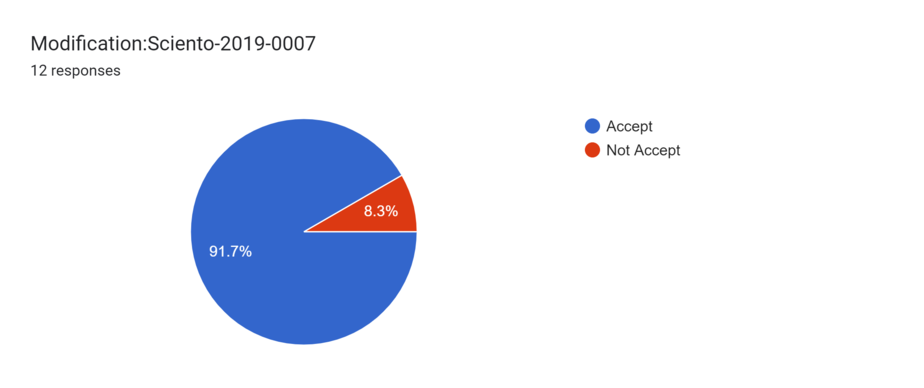Modification:Sciento-2019-0007
Accept that the verdict on suggested modifications is to be decided by a communal vote that will follow the discussion period. Have a communal discussion and decide as to what percentage of votes it should take for a modification to be accepted - a simple majority (50% +1), or supermajority of three fifths (60%), two thirds (67%), or three quarters (75%). Also discuss to decide as to how long the discussion period and the voting period should be.
The modification was suggested to Scientonomy community by Hakob Barseghyan and Jamie Shaw on 22 December 2019.1 This modification is incompatible with Sciento-2019-0008. The modification was accepted on 25 February 2023.
Preamble
The current scientonomic workflow has no proper closure mechanism, for it is ambiguous as to how verdicts on suggested modifications are to be achieved. Specifically, it is unclear as to what constitutes a consensus. It is implicit in the current practice that consensus is understood as a lack of explicit objection, i.e. if nobody objects to a suggested modification then even a handful of positive comments are sufficient to make the modification accepted. However, there are problems with this approach. Specifically, people may not want to accept the modification, but may not want to object to it explicitly for a variety of reasons. For instance, some people may not wish to be seen as impeding the modification's acceptance. If a modification is proposed or supported by a senior member of the community, then many - especially junior scholars - may feel uncomfortable criticizing it. It is also the case that different members of the community may have different “tenacity” when debating proposed modifications: some people may withdraw from a debate because they grow tired of arguing rather than because they are convinced. In addition, the current workflow imposes no time limits on when objections can be raised by. This creates two issues: in some cases suggested modifications are accepted too quickly before dissent has a chance to emerge, while in other cases suggested modifications are not accepted for a long time despite the lack of dissent. In short, without a proper closure mechanism or a time limit in place, suggested modifications can be accepted either prematurely or become abandoned. Thus, a solution is needed to ensure that the workflow has a proper closure mechanism and a time limit.
Modification
Theories To Accept
- Closure Mechanism - Time Limit and Communal Vote (Shaw-Barseghyan-2019): The verdict on a suggested modification should be decided by a communal vote that will follow the discussion period.
Questions Answered
This modification attempts to answer the following question(s):
- Workflow - Closure Mechanism: How should verdicts on suggested modifications be achieved? If modifications are accepted as a result of a communal consensus, then what constitutes such a consensus?
Verdict
The modification was accepted on 25 February 2023. Prior to the 2023 workshop, Ameer Sarwar argued against the modification. First, he noted that voting is not an appropriate mechanism in science where the goal is to unearth truth.c1 Second, it is unclear how we can ensure informed voting given that some members of the community could be inactive for several years. He thus suggested that we should keep this modification open and wait until after the resolution of modifications 2019-0002 and 2019-0003 that suggest alternative ways to increase participation. During the workshop, the modification was generally well received. Before voting, there was some concern about our voting process – who can vote and when can they vote? – voiced by Josh Allen and Paul Patton. Additionally, Deivide Garcia and Amirali Atrli raised concerns about who are “allowed” to function as part of the scientonomy community. Patton also suggested introducing quorum in addition to the 2/3rds stipulation to avoid potential modifications to the scientonomic body of knowledge introduced by a small number of participants. Gregory Rupik along with Jamie Shaw indicated that while quorum makes perfect sense for larger decision-making bodies, our capacity to vote should not hinge on who is absent, but rather on who is present. It was also determined that even though there is always a risk of a small group of people making big changes, or with people being unsatisfied with a modification they were not allowed to vote on, the iterative nature of our process ensures that there are easy solutions here; in addition, as Spenser summarized, most people in academic environments can be trusted to self-police. Rupik also highlighted the need to formalize the acceptance mechanism in the encyclopedia explicitly: i.e. without 3 comments with unanimity, the modification will be discussed at a workshop, and it is possible that it will remain open after the workshop, in which case we will wait until the next workshop to further discuss and modify it. Notably, since this proposal represents an attempt to formalize a voting system and closure mechanism, and itself was not subject to a specific voting system, it was decided by those present that we would accept this modification with a minimum of 2/3rds assent. The modification was accepted with overwhelming support.
Click on the Discussion tab for comments.
References
- ^ Shaw, Jamie and Barseghyan, Hakob. (2019) Problems and Prospects with the Scientonomic Workflow. Scientonomy 3, 1-14. Retrieved from https://scientojournal.com/index.php/scientonomy/article/view/33509.
